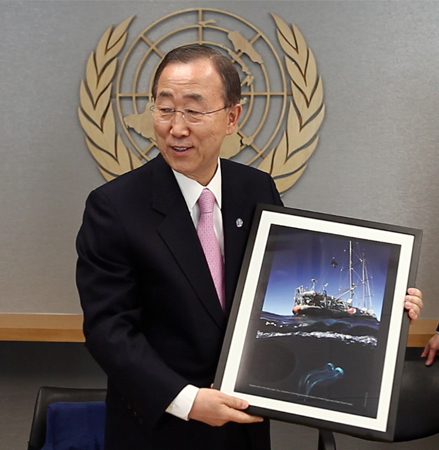
“Tara” is a 119-ft aluminum schooner built in 1987 and named “Antarctica” for Jean-Louis Etienne for exploration.

Repurchased in 1999 by Sir Peter Blake and renamed “Seamaster” and used as a platform for ecological research in the Amazon. Sir Peter Blake was murdered by pirates onboard in December 2001.
Now named “Tara” and owned by Agnes B., Etienne Bourgois.

On her last expedition, Tara Arctic, she spent 507 days encased in the Arctic ice while scientists studied global warming and the melting of the polar ice cap. Tara was sailed to the cold latitudes north of Alaska in August of 2006 and let the ice grab her. Fortunately, the rounded shape and steeply flaring sections of the boat were designed specifically to handle this situation — which doomed many ships in the old days. During her ride across the Arctic ‘conveyor belt’, Tara averaged about six miles a day, and she passed closer to the north pole — 88 nautical miles — than any vessel ever.

Tara is now on a 2.5 year 150,000-kilometer voyage that is taking her through every ocean on the planet. Scientists are studying plankton concentrations and various other experiments.

Tara Oceans is the very first attempt to make a global study of marine plankton, a form of sea life that includes organisms as small as viruses and bacterias, and as big as medusas. Our goal is to better understand planktonic ecosystems by exploring the countless species, learning about interactions among them and with their environment. Marine plankton is the only ecosystem that is almost continuous over the surface of the Earth. Studying plankton is like taking the pulse of our planet.

Recently, scientists have discovered the great importance of plankton for the climate: populations of plankton are affected very rapidly by variations in climate. But in turn they can influence the climate by modifying the absorption of carbon. In a context of rapid physico-chemical changes, for example the acidification observed today in the world’s oceans, it is urgent to understand and predict the evolution of these particular ecosystems.
Finally, plankton is an astonishing way of going back in time – a prime source of fossils. Over the eons, plankton has created several hundred meters of sediment on the ocean floors. This allows us to go back in time, to the first oceans on Earth, and better understand the history of our biosphere.

For the last and most important stop-over in the USA, the Tara team had a series of strategic meetings in New York, before heading out to sea for the return trip to Lorient, France.
Besides the many schools that came aboard to visit, public conferences, and various encounters with prominent Americans, the stop-over in New York represents an important step for Tara in consolidating our partnership with the United Nations in view of the Rio+20 conference in June – an international meeting that will accord a large place to negotiations about the future of the world’s oceans.

Among the high points of this week, priority goes to the historic meeting of agnès b., Etienne Bourgois, Romain Troublé and Eric Karsenti with the UN Secretary General, Ban Ki Moon, who reaffirmed his engagements concerning the oceans, and saluted the Tara Oceans project as an example to be followed by the scientific community. Ban Ki Moon, speaking in French, agreed to support the activities proposed by Tara at the Rio+20 conference, and has been especially invited to the screening of the coming Planet Oceans film. Several other important meetings took place in New York, involving the continuation of the research done by Tara Oceans and its international impact:
For more about Tara see http://oceans.taraexpeditions.org/
